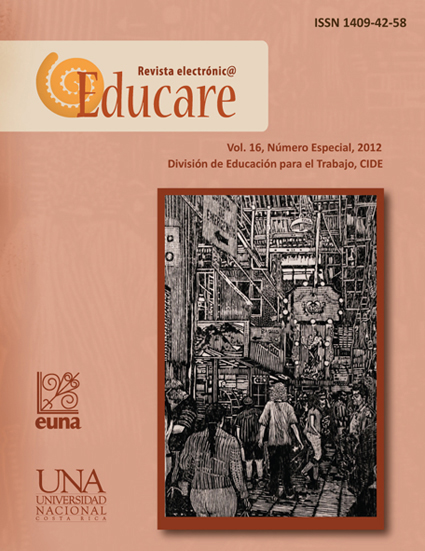Counseling in Improving the Quality of Life of the Senior Population: Creating Action Opportunities
DOI:
https://doi.org/10.15359/ree.16-Esp.5Keywords:
Senior population, counseling, self-concept, autonomy, quality of life.Abstract
In view of the constant demographic changes and the accelerated growth of the senior population in our country, it becomes necessary to create and enhance appropriate Counseling opportunities. It is necessary to pursue, at any time, the personal satisfaction, fulfillment and best quality of life for the elderly population through their active participation and self-awareness, and by developing social aspects that will contribute to their growth as a complete and socially active person. In order to face the cultural changes and the actual demands of our senior population, Counselors should be open to new intervention approaches that will help them to respond to social and personal emergent needs.References
Buendía, J. (1997). Gerontología y salud. Madrid, España: Biblioteca Nueva
Hidalgo, J. G. (2001). El envejecimiento. Aspectos sociales. San José, Costa Rica: EUCR.
Hough, M. (1996). Técnicas de orientación psicológica. Madrid: Narcea.
Kastenbaum, R. (1979). Vejez: años de plenitud. Holanda: Multimedia publication.
Laforest, J. (1991). Introducción a la gerontología. El arte de envejecer. Barcelona: Herder.
Méndez, E. (1999). Determinantes sociales en la calidad de vida de las personas mayores en
residencias para ancianos. Anales en Gerontología, 1, 25-35.
Quintero, M. G. y González, U. (1977). Calidad de vida, contexto socioeconómico y salud en
personas de edad avanzada. En J. Buendía (Ed.), Gerontología y salud: Perspectivas actuales
(pp. 129-146). Madrid: Biblioteca Nueva.
Salas, E. (1992). ¿Cómo orientar? Chile: Editorial Universitaria.
Sánchez, C. D. (2000). Gerontología social. Argentina: Espacio.
Downloads
Published
How to Cite
Issue
Section
License
1. In case the submitted paper is accepted for publication, the author(s) FREELY, COSTLESS, EXCLUSIVELY AND FOR AN INDEFINITE TERM transfer copyrights and patrimonial rights to Universidad Nacional (UNA, Costa Rica). For more details check the Originality Statement and Copyright Transfer Agreement
2. REUTILIZATION RIGHTS: UNA authorizes authors to use, for any purpose (among them selfarchiving or autoarchiving) and to publish in the Internet in any electronic site, the paper´'s final version, both approved and published (post print), as long as it is done with a non commercial purpose, does not generate derivates without previous consentment and recognizes both publisher's name and authorship.
3. The submission and possible publication of the paper in the Educare Electronic Journal is ruled by the Journal’s editorial policies, the institutional rules of Universidad Nacional and the laws of the Republic of Costa Rica. Additionally, any possible difference of opinion or future dispute shall be settled in accordance with the mechanisms of Alternative Dispute Resolution and the Costa Rican Jurisdiction.
4. In all cases, it is understood that the opinions issued are those of the authors and do not necessarily reflect the position and opinion of Educare, CIDE or Universidad Nacional, Costa Rica. It is also understood that, in the exercise of academic freedom, the authors have carried out a rogorous scientific-academic process of research, reflection and argumentation thar lays within the thematic scope of interest of the Journal.
5. The papers published by Educare Electronic Journal use a Creative Commons License:














 The articles published by Educare Electronic Journal can be shared with a Creative Commons License:
The articles published by Educare Electronic Journal can be shared with a Creative Commons License: 



